Spoilers below for Doctor Strange, Iron Man, Age of Ultron, Captain America: Civil War,
I just recently watched Doctor Strange for the first time. Afterwards, I immediately went to two of my three favorite reviewers to see what they had to say about the movie. Screen Junkies and Hishe both compared the movie heavily to Iron Man, saying that it is basically the same movie. Instinctively, this felt wrong to me, mainly because I was thinking of the main characters and how different they were, despite everyone seeming to think they are the same. So I went back and watched Iron Man again, because let’s face it, it’s been a while, and luckily it was on Prime (btw, Iron Man is distributed by a different company than later MCU movies, along with Thor and the first Captain America movie, so it is doubtful that you will see all of the MCU movies on the same streaming service or in a box set). Having watched it again, so quickly after having watched Doctor Strange, I can tell you without a doubt that the only two things these have in common are that they are both hero’s journey stories (which is one of like five stories you can tell) and both superhero origin stories (which is needed when you introduce a new superhero. Duh.). Otherwise, I found these movies very different.
“But Aren’t They Both Just Arrogant Jackasses?”
Arrogance is a trait both Tony Stark and Stephen Strange carry; however, in truth, Strange only seems arrogant. Many people have previously called Stark a narcissist. In point of fact, by psychological definitions, he is not. Strange, on the other hand, very much has narcissistic personality disorder. Stark is full of himself, but he grew up in money and prestige and genius with a demanding and distant father. As such, Stark doesn’t care about much except having a good time when we are first introduced to him in Iron Man. He is child without adult supervision. He has fun whenever he can, however he can. He doesn’t care if the company is truly successful or how, just that it keeps him in money (i.e. fun). He has no real goals. It’s just party, party, party all the time.
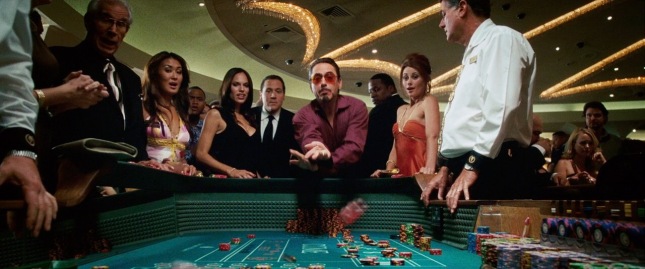 He plays craps when he should be getting a prestigious award and gives that award away to a stranger on a whim, because awards from society or friends don’t matter.
He plays craps when he should be getting a prestigious award and gives that award away to a stranger on a whim, because awards from society or friends don’t matter.
He races his bodyguard/driver to get to his private jet, where he left his more serious friend to wait hours.
 His flight attendants bring him drinks and double as strippers. It’s all fun. And it is all pointless. His lack of care is what almost got him killed. If he had been more on his guard, more involved with his company, he would have figured out that Stane was selling their weapons to terrorists and kicked him out long ago. But he didn’t care. He was having fun. What did Yensin say to him? “Don’t let your life be a waste.” Most everyone puts Tony Stark as either an ENTP or J. You can look up their profiles here and here.
His flight attendants bring him drinks and double as strippers. It’s all fun. And it is all pointless. His lack of care is what almost got him killed. If he had been more on his guard, more involved with his company, he would have figured out that Stane was selling their weapons to terrorists and kicked him out long ago. But he didn’t care. He was having fun. What did Yensin say to him? “Don’t let your life be a waste.” Most everyone puts Tony Stark as either an ENTP or J. You can look up their profiles here and here.
Now compare that to the Doctor Strange we are introduced to at the beginning of the film. He prides himself on knowing useless information so that he can stump his coworkers, a way to one up them. He also prides himself on beating his coworkers down when they make a mistake. He’ll do this in front of everyone and make sure everyone knows that the gravity of his coworker’s mistake and that he’s the one to fix it. He wants to break new ground medically and wants procedures he creates named after him, even though he has to be reminded that he alone did not create those procedures. He loves going to award ceremonies for himself.
He has only the best home, only the best clothes, only the best accessories, and only the best cars.
Only the best.
All his past awards are displayed in a rather large and showy case, so that anyone who comes to his home knows just how awesome his is. He has to pass all other drivers to show that he is the best driver. He refuses to take cases that others can solve and refuses to take cases with a low probability of success. For him, everything is about status. Showing to the world around him that he is the best. That no one is as good as him at anything and that he is perfect and never fails. What does the Ancient One say to him? “You did it because of your fear of failure.” I would put Doctor Strange as an INTJ because he is a jack of trades when it comes to knowledge, has a great memory, doesn’t see the point in much social interaction, is a self learner, and rules that don’t make sense are ignored, but once they make sense from new information, they are followed. Others have agreed with this, while others disagree. But personality types are hard to lay out on a character in the first place, but the two in question are obviously not the same type.
Inciting Incidents
These two men are faced with very different psychological problems. There isn’t really a disorder for what Tony has (maybe there should be: HPD, hedonistic personality disorder?), but it is clear that Strange has NPD. Tony Stark is shown to have no fear of failure, and he shouldn’t because he is an inventor. They fail all the time. It’s a constant working through set backs and failed versions. We get three different Iron Man suits in the first movie. We get multiple tests that go haywire too. None of that seems to set Tony back at all. He just keeps going, working out the kinks. In fact, we laugh with him as he works them out. While his lack of care got him into trouble, that trouble got him out of his apathy. When Yensin dies, he suddenly has a reason to care. He realizes that by ignoring his company, innocent people were getting hurt and that was his fault. So he was going to do something about it. Failures be dammed.
Strange’s own psychological problems led to his own downfall as well, but Tony obviously recovered much quicker and better than Strange did. He could still work no problem. The car crash, caused by Strange’s desire to be the best at everything, resulted in the loss of his abilities as a doctor. This destroyed everything Strange had been working for all his life. He couldn’t work anymore. There would be no more awards, no more breakthroughs, no more adulation. He wasn’t just a failure; he couldn’t even try. Unlike Tony Stark, who became a better person for his inciting incident, all the worst traits of an NPD were maximized in Strange upon his accident. NPDs are hard enough to be around when they are successful, as they tend to rub everyone’s nose in their success, but they are far, far worse when they have failed. They lash out at the people around them in cruel and hurtful ways and may even become violent for it. So failure only worsens their condition, which is why Strange avoided it all his life and career. Strange becomes obsessed with fixing the cause of his failure as he sees it: his hands. The reality is that his failure came from his fear of it because he had to be the fastest driver. It is almost cruel of a writer to do what happens to Strange, not because he was such a nice guy, but because he was functioning somewhat well even if he couldn’t have healthy personal relationships.
The Journey
Tony Stark’s journey is pretty straight forward: shut down the weapons manufacturing, create a better suit to help the people his weapons have hurt. He gets a little side-tracked on the second part because it is more fun, thereby making it harder to do the first part. He’s still a little too focused on the fun. But it’s not much of a sidetrack really. Iron Man, by and large, is a very simple, plot-based movie, so it’s hard to give the hero’s journey too much attention. Tony actually keeps choosing the more fun options throughout most of the movies. Fun for Tony is also about what is most interesting from a scientific standpoint. That’s why he made Ultron. It’s not until after Ultron that Tony finally realizes that scientifically interesting may also mean dangerous. That takes quite a while.
Strange’s journey is more focused and interesting. He has to learn “that it’s not about [him]”. The Ancient One keeps recognizing exactly what’s wrong with Strange and saying it to him point blank. This is where things take an interesting turn from a psychological and social standpoint. NPDs never seek professional help, because they don’t think anything is wrong with them. After all, they are perfect, the best of the best. Everyone else has a problem. But when Strange loses the use of his hands and Western medicine cannot help him at all, he becomes so desperate that he is willing to look for answers in places that don’t have the kind of controls that modern medicine has. He has looked everywhere else for the answer, so now it’s time too look in the shadier corners. When he comes to the Ancient One, he believes that she is still a scientist, but that she is doing something illegal. When it turns out that she is more of a mystic than a scientist, he scoffs at her ideas. Until she blows his mind. Now we don’t have the ability to blow the mind of an NPD the way the Ancient One did, but if we did, I imagine it would have a profound psychological impact on them. After he asks her to teach him and she refuses, we see just how low Strange has been brought. He is there for hours, begging to be let back in. The last thing he says before they open the door is “I’ve got nowhere else to go.” Strange truly has been destroyed at this point. He is a complete and utter nothing. But when they open the door, amazingly, the first thing out of his mouth is a feeble “Thank you.” It gets a laugh, but it also shows something interesting. I do not believe that had he fallen through a door before he had been brought this low that he would have said “thank you.” Instead I believe he would have berated the person for opening the door while he was leaning against it. He has been changed. Finally.
But he is still arrogant and still afraid of failure. Well, a cure for a personality disorder doesn’t happen in one fell swoop. Now, some psychologists and laymen don’t believe that personality disorders can be cured, especially not NPD. It’s just who they are, right? Why else would they call it a personality disorder if it wasn’t a personality? Well, they’ve found that with certain treatments some people can lose symptoms of a personality disorder, thus sliding out of the DSM requirements to be diagnosed with that disorder. The one that seems to have some of the best results is borderline personality disorder, which with certain medications, one-on-one counseling, and group DBT therapy can cause actual recovery. The problem is that too many psychologists don’t try to get their patients to recovery, just through the day to day, and too many sufferers of personality disorders consider themselves unworthy of treatment, incapable of recovery, or, in the case of almost every NPD, perfectly fine the way they are. Now there is not a lot of research into if NPDs can recover because of the very fact that they don’t think anything is wrong with them. Doctors can’t research patients that don’t go to the doctor. But recovery from any ingrained psychological condition, especially one that took someone as far as it took Doctor Strange, is time consuming and not at all quick. So yes, Strange is still kind of a dick. But why is the Ancient One’s method’s working at all?
Many Western philosophies deal in the idea of the individual and the importance of each individual. Things such as subjectivity vs objectivity, perception, sensation, aesthetics, and signicance tend to run through most of these philosophies. Many Eastern philosophies, on the other hand, deal greatly with the unimportance of self, the destruction of the individual, sacrifice of self, all to achieve a greater unity with the world. NPD, which most laymen will understand is about narsicsim, is all about the self. The self is most important. Especially, the perception of others of that self. So perceptively, the Ancient One doesn’t buy the bull that Strange keeps trying to sell her. She repeatly calls him Mister and corrects him when he tries to correct her. Every time he tries to tell her who he is or what his motivations are, she calls him a liar. And he confirms what she says too. He has been brought low by his accident, then shown how insignificant he was when she showed him the multiverse, and she will not let him lie about who he is. He is experiencing a distruction of self. Whether he likes it or not. It’s interesting to note at this point that most psychological disorders do not cross cultures. The WHO is trying to come up with an international way of looking at psychology, but it seems that culture ties too tightly into what is considered disordered and how disorders form. As such, I’ve never heard of NPD in China and the like. An ingrained cultural sense that the self is unimportant may in fact prevent NPD altogether. So perhaps the correct treatment of NPD is the destruction of self.
Because what happens at the end? Doctor Strange is destroyed, and again, and again, and again, and again. And again, and again, and again. In fact, as he puts it he’s losing over and over again. Finally, Strange understands that failure is not to be feared. In fact, at times, it is the only way to succeed. It is also interesting to note that Dormammu was played by Cumberbatch as well, adding into the internal struggle metaphor of Doctor Strange. Not only did he set it up so that he would fail over and over again, but is also being destroyed by himself every time.
Now some would counter that Strange doesn’t really have NPD because he loves Christine and NPDs and some other personality disorders preclude the capability of love but I just believe it often precludes healthy expression or experience of love. No where in the DSM definitions of personality disorders does it list a symptom as “incapable of love”. It may say “poor interpersonal relationship skills” or something to that effect. So please stop saying these people are incapable of love. Strange displays the required number of symptoms to be diagnosed as a NPD, and by the end of the movie he has lost enough symptoms to be considered cured. He is humble and self-sacrificing. A complete 180.
We just don’t get the kind of in depth character ark or metaphorical play in Iron Man that we got in Doctor Strange. It was the first attempt. They didn’t have much of a script. And they didn’t really know what they were doing. We’re now in phase three. The characters are starting to become better out the gate and the older ones, like Tony Stark, are becoming more complex real people as well. It’s not really until Iron Man 3 that we see that Tony can be vulnerable, it’s not until The Avengers: Age of Ultron that he allows fear to get the better of him, and it is not until Captain America: Civil War that we see him try truly to make up for the mistakes he made as Iron Man. Iron Man’s journey is actually the journey of the MCU. It’s all fun; whoa, things just got scary, better step it up a notch; crap, I went too far. In fact, in Iron Man it’s all fun even when killing people, which Tony has no compunctions about. Which makes sense given the fact that he grew up on the money of weapons manufacturing. Doctor Strange, on the other hand, is introduced in the “crap, I went too far” stage, so he kills one guy and is immediately upset by it. After all, he is a doctor. The Ancient One kind of calls BS on him again, but I don’t believe Strange is really lying when he says he’s upset for killing that man. He was fighting for his life and he gets that, but he’s not okay with how far he had to go. He didn’t want to be part of a mystic war. In fact, he said just that right before the fight started. Tony has no issues killing what he probably thinks of as “enemy combatants”. There is no moment of “Oh, my god. I killed someone” for Tony in the first movie. Probably because he knows as a weapons manufacturer he has blood on his hands and to him making and selling the weapons is no different than firing them. It is actually an admirable stance for Tony to take for it makes it clear that to him he is responsible and that is his fight in the first movie. But it is barely touched on. The whole movie is party and doesn’t go too deep into the ideas of responsibility or hedonism.
Finally the Facial Hair
Interestingly, Stan Lee has stated that Tony Stark was based on Howard Hughes and Doctor Strange was based on Vincent Price. Now, Stark was based on Hughes’ personality wise, the high-flying, the girls, the parties, etc. Strange was based on Price’s look. He’s often voiced in a Price kind of way too. Luckily, we didn’t get that in the movie from Cumberbatch who just played him straight. So the beards seem kind of like a coincidence to me. I’ve never quite gotten Stark’s facial hair to be honest. It’s just a very strange look, that they even did in the movie. It tends to go back along his jaw but not all the way along his jaw and up around his mouth but not to meet his mustache. That’s weird. They did eventually change it in the movies to just a bushy, dark van dyke so that it wasn’t so weird. Strange’s on the other hand is a pretty straight forward thin van dyke. I can dig that. It’s been done before. Stark’s not so much. Who the hell takes the time to do that to their face? Stark apparently. I guess he is rich. Probably has a barber come in and do it for him on a regular basis. They’ve also pretty much updated it in the comics too. For which, I’m glad.
Conclusion
Way better than Iron Man. Like a thousand times. And Iron Man is enjoyable. It’s just not got the depth and social implications and work that Doctor Strange has. I wasn’t expecting to enjoy Doctor Strange as much as I did, but I wasn’t expecting to enjoy Ant-Man or Guardians of the Galaxy as much as I did either. My favorite Marvel characters are Spider-Man, Wolverine, Psylocke, Deadpool, and Black Widow, and so far Ant-Man, Guardians of the Galaxy, and Doctor Strange have been my favorite movies. It’s hard to please me when four out of five of my favorite characters are not readily available to MCU. Now Spider-Man is and I’ve been disappointed by what they’ve done with him so far. It’s hard to top Spider-Man 2 for story and character development. And I am not a fan of Iron Man knowing his identity as no one is supposed to know who he is. Overall, I think the greatness of Ant-Man, Guardians, and Strange come from the actors and/or great story and character development. Doctor Strange was directed by a (creative) fan of the character, which I believe we can all agree can be very important to the success of an adaptation. See below.
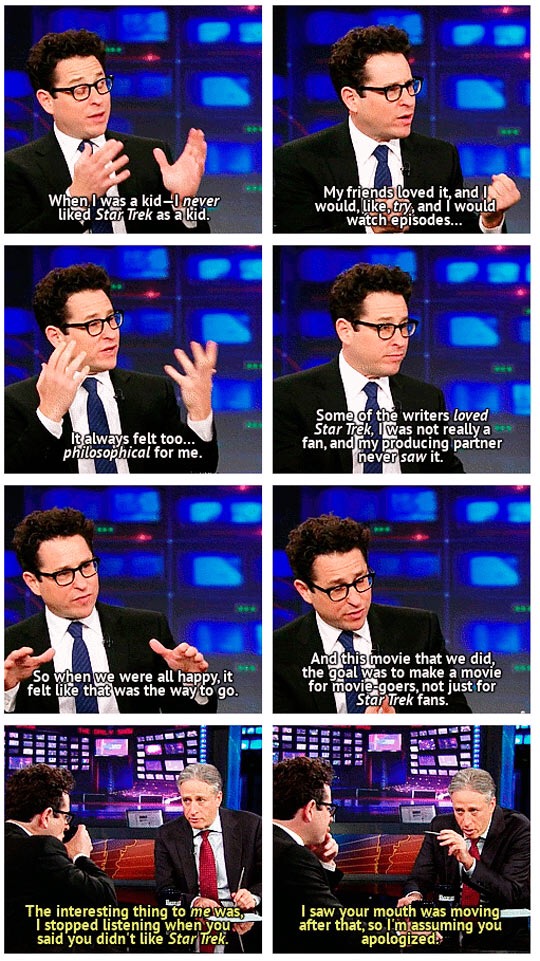
Here’s a singular idea: don’t direct it if you weren’t a fan. It means you didn’t understand or care about the central themes. That’s important to creating a new story with that IP. More than the world creation or plots. Scott Derrickson got that and that’s why he did such a good job with Doctor Strange: themes, not plots, matter.
And that’s all I have to say about that.
P.S.
I will be going to a double feature for Guardians fo the Galaxy tomorrow before it premiers on Friday, so look for my first thoughts this weekend. I usually like to watch a movie several times and think about it a while before I write my full review but I’ll try to give a recommendation at the very least. Happy watching and reading!
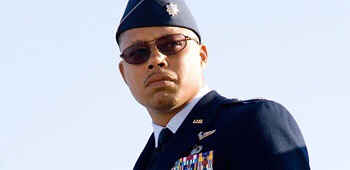
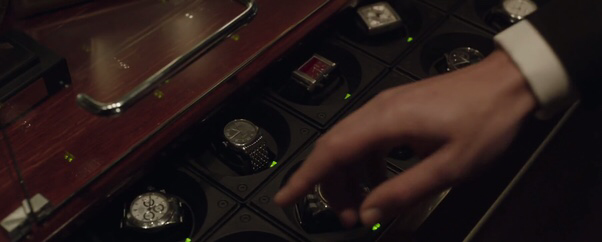
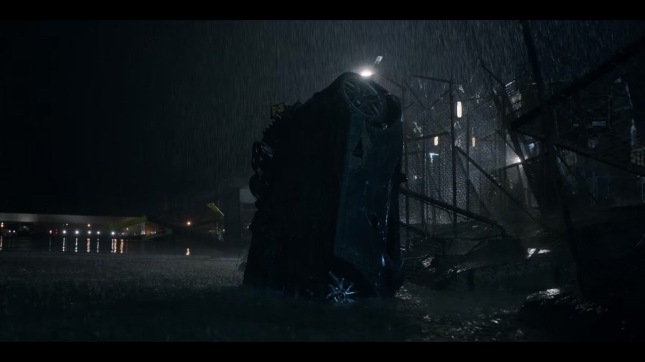
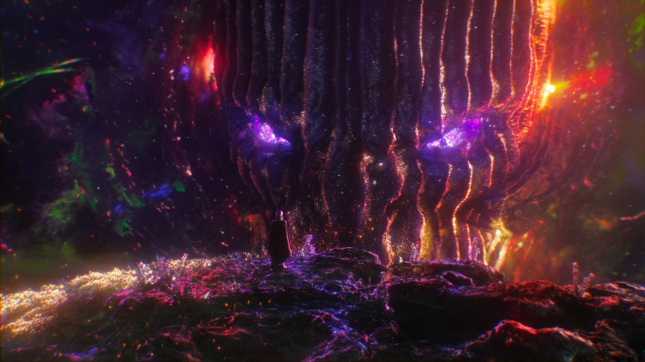
One response to “Doctor Strange: A Comparative Review”